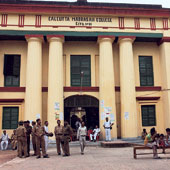 |
| The Calcutta Madrasah College. Picture by Pabitra Das |
Calcutta Madrasah, recently upgraded to a deemed university, is set to introduce courses in computer science, journalism, business administration and nursing next month.
“Chief minister Buddhadeb Bhattacharjee has cleared the proposal as part of the madarsa’s modernisation programme. We are planning to introduce six courses from mid-September,” Syed Samsul Alam, the vice-chancellor of Aliah University, told Metro.
Such courses are being introduced for the “first time in the 229-year-old institution”. “Modernisation is the need of the hour. The courses will help students from minority communities to find jobs,” Alam added.
The university will offer an M.Sc in computer science, MCA, MBA in hospitality management, courses in retail management and nursing and a postgraduate diploma in media science.
“The media science diploma is a two-year course. The other courses will be of five years duration. Students belonging to minority communities from across the state will be selected on the basis of merit to pursue these courses,” said Alam.
Established in 1780, the madarsa was declared a college two years ago. Later, the state government passed a bill in the Assembly to confer university status to Calcutta Madrasah College.
According to the vice-chancellor, private institutes will provide technical expertise to run the courses.
State minorities minister Abdus Sattar said the courses will be a boon to students belonging to minority communities.
“We are planning to build a full-fledged campus with state-of-the-art facilities. The land has been earmarked and work will start soon,” he pointed out.
Teachers of the university described the government’s initiative as “a positive move”.
“Reforms are needed to uplift the image of the minority community and the government has taken a step in the right direction,” said Tanweer Ahmed, the registrar.
Students of the university are currently being taught computer operations, spoken English and foreign languages. A teacher said the modernisation of the syllabus has been necessitated by the realisation that theology-based education would not guarantee jobs.
A section of students and former teachers are opposed to the mode of modernisation. There is also an infrastructure problem. Currently, there are only six classrooms and two office rooms.
“We do not have adequate number of dedicated teachers. There is a lack of both teaching and non-teaching staff. In the absence of basic infrastructure, students won’t benefit from these courses,” said a representative of the madarsa’s students’ union.










